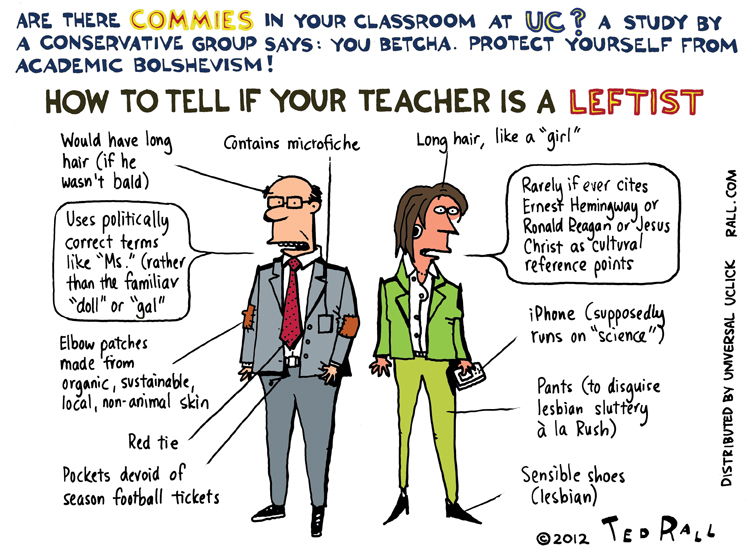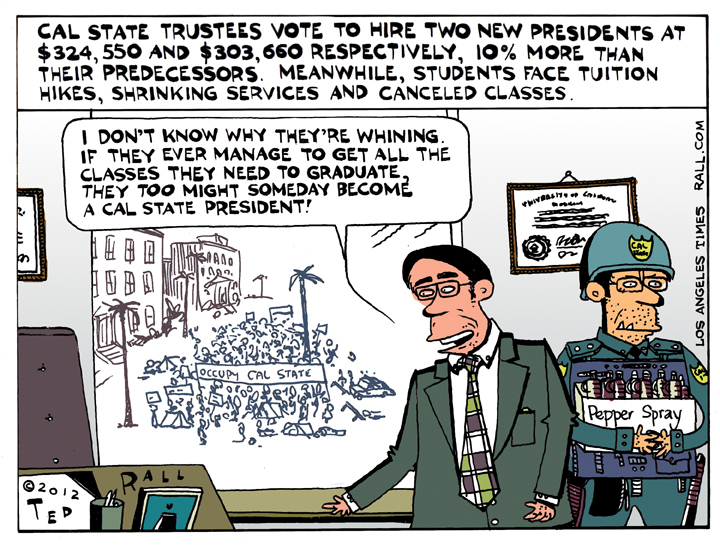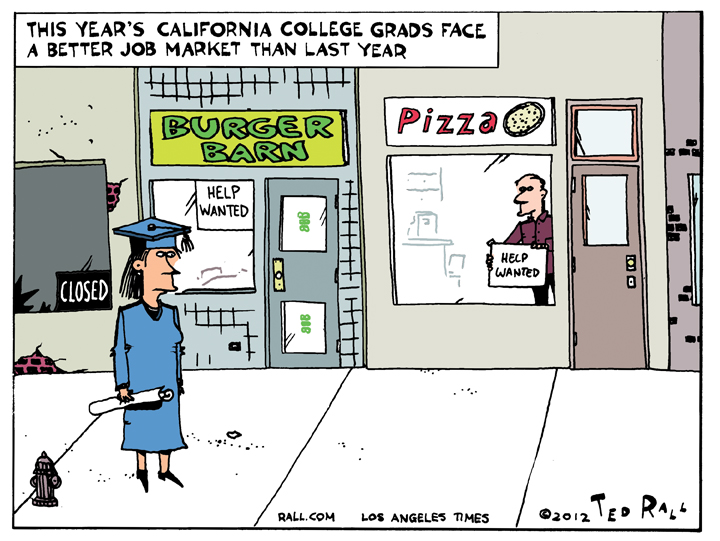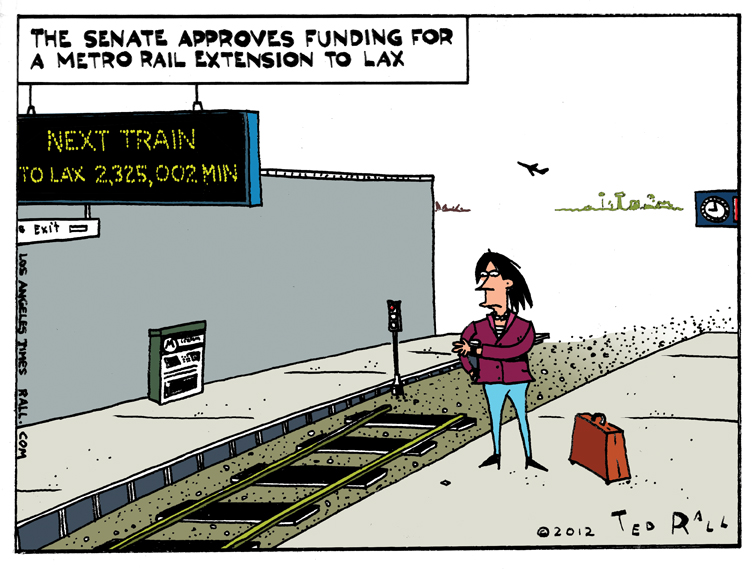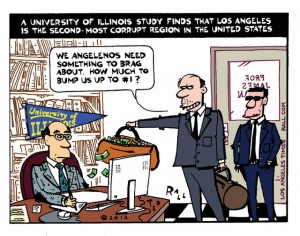I draw cartoons for The Los Angeles Times about issues related to California and the Southland (metro Los Angeles). This week: U.S. Border Patrol agents are asking Mexican and Central American TV stations to discourage illegal immigration. But simply reporting the news about the terrible US economy ought to do the trick.
How To Tell If Your Teacher Is A Leftist
I draw cartoons for The Los Angeles Times about issues related to California and the Southland (metro Los Angeles). This week: Are there commies in classrooms at the University of California? A study long on innuendo and short on facts commissioned by a conservative group shouts: you betcha! How can you and your children protect themselves from academic bolshevism?
Los Angeles Times Cartoon: Cal State Presidents Cash In
I draw cartoons for The Los Angeles Times. This week’s offering: Cal State trustees have voted to hire two new presidents at high salaries, 10% more than their predecessors. Meanwhile, students face class cancellations and budget cuts.
Los Angeles Times Cartoon: More Bad Jobs
I draw cartoons for The Los Angeles Times. This week comments on the “good news” that recent college grads are getting more job offers than last year.
Los Angeles Times Cartoon: Waiting
I draw cartoons for The Los Angeles Times. This week we look at the possible imminent conclusion to the long wait LA commuters have endured until their Metro system finally makes it all the way to Los Angeles International Airport.
Some people I showed this to asked why I depicted a woman instead of a man because you know, the “generic human” is a white male in his 50s (perhaps, in an editorial cartoon, wearing a hat). As readers know, I try to avoid such tired tropes as much as possible. Women take trains too.
Los Angeles Times Cartoon: The Great Hunter
I draw a weekly editorial cartoon for The Los Angeles Times. With a little luck—and a bigger budget for hiring—this might turn into a staff cartooning job where I’d be doing work about Los Angeles and California throughout the week. If you’re an LA Times reader and you’d like to see me do more work for them, please let them know!
Here is this week’s offering: California Fish and Game President Daniel W. Richards shot and ate a mountain lion in Idaho, where it’s legal. Where will he go next?
Los Angeles Times Cartoon
I draw a weekly editorial cartoon for The Los Angeles Times. With a little luck—and a bigger budget for hiring—this might turn into a staff cartooning job where I’d be doing work about Los Angeles and California throughout the week.
Here is this week’s offering: A University of Illinois study finds that Los Angeles is the second-most corrupt region in the United States.
SYNDICATED COLUMN: Quit Whining About Student Loans
Time for #OWS to Broaden Its Appeal
It has been 30 days since Occupy Wall Street began. The movement hasn’t shaken the world à la John Reed—not yet—but at one thousand occupations and counting, it can’t be ignored.
OWS has become so impressive, so fast, that it’s easy to forget its half-assed origin. No matter. The fact that the French Revolution was partly set off by the drunken ravings of the Marquis de Sade hardly reduces its importance.
Soon the Occupiers will have to face down a number of practical challenges. Like weather. Winter is coming. Unless they move indoors, campers at Occupy Minneapolis and Occupy Chicago will suffer attrition. But indoor space is private property. So confrontation with the police seems inevitable.
As I saw at STM/Occupy DC, there is an ideological split between revolutionaries and reformists. Typical of the reformists: This week OWSers urged sympathizers to close their accounts with big banks like Citibank and Bank of America and move their savings to credit unions and local savings and loans. If revolutionaries get their way, there will be no banks. Or one, owned by the people.
There is no immediate rush, nor should there be, to issue demands. The horizontal democracy format of the Occupy movement’s General Assemblies is less about getting things done than giving voices to the voiceless. For most citizens, who have been shut out of politics by the fake two-party democracy and the corporate media, simply talking and being heard is an act of liberation. At some point down the road, however, the movement will come to a big ideological fork: do they try to fix the system? Or tear it down?
The Occupiers don’t have to choose between reformism and revolution right away—but they can’t wait too long. You can’t make coherent demands until you can frame them into a consistent narrative. What you ultimately want determines what you ask for in the time being—and how you ask for it.
Trotsky argued for the issuance of “transitional demands” in order to expose the uncompromising, unjust and oppressive nature of the regime. Once again, an “epoch of progressive capitalism” (reformism, the New Deal, Great Society, etc.) has ended in the United States and the West. Thus “every serious demand of the proletariat” de facto goes further than what the capitalist class and its bourgeois state can concede. Transitional demands would be a logical starting point for an Occupy movement with a long-term revolutionary strategy.
Both routes entail risk. If the Occupiers choose the bold path of revolution, they will alienate moderates and liberals. The state will become more repressive.
On the other hand, reformism is naïve. The system is plainly broken beyond repair. Trying to push for legislation and working with establishment progressives will inevitably lead to cooption, absorption by big-money Democrats and their liberal allies, and irrelevance. (Just like what happened to the Tea Party, a populist movement subsumed into the GOP.)
Revolution means violence in the streets. Reform means failure, and the continued, slow-grinding violence by the corporate state: poverty, repression, injustice.
At this point, job one for the movement is to grow.
I don’t mean more Facebook pages or adding more cities. The day-to-day occupations on the ground need to get bigger, fast. The bigger the occupations, the harder they will be for the police to dislodge with violent tactics.
More than 42 percent of Americans do not work. Not even part-time. Tens of millions of people, with free time and nothing better to do, are watching the news about the Occupy movement. They aren’t yet participating. The Occupiers must convince many of these non-participants to join them.
Why aren’t more unemployed, underemployed, uninsured and generally screwed-over Americans joining the Occupy movement? The Los Angeles Times quoted Jeff Yeargain, who watched “with apparent contempt” 500 members of Occupy Orange County marching in Irvine. “They just want something for nothing,” Yeargain said.
I’m not surprised some people feel that way. Americans have a strong independent streak. We value self-reliance.
Still, there is something the protesters can and must do. They should make it clear that they aren’t just fighting for themselves. That they are fighting for EVERYONE in “the 99 percent” who aren’t represented by the two major parties and their compliant media.
OWSers must broaden their appeal.
Many of the Occupiers are in their 20s. The media often quotes them complaining about their student loans. They’re right to be angry. Young people were told they couldn’t get a job without a college degree; they were told they couldn’t get a degree without going into debt. Now there are no jobs, yet they still have to pay. They can’t even get out of them by declaring bankruptcy. They were lied to.
But it’s not about them. It’s about us.
The big point is: Education is a basic right.
Here is an example of how OWSers could broaden their appeal on one issue. Rather than complain about their own student loans, they ought to demand that everyone who ever took out and repaid a student loan get a rebate. Because it’s not just Gen Y who got hosed by America’s for-profit system of higher education. So did Gen X and the Boomers.
No one will support a movement of the selfish and self-interested.
The Freedom Riders won nobility points because they were white people willing to risk murder to fight for black people. Occupiers: stop whining about the fact that you can’t find a job. Fight for everyone’s right to earn a living.
The Occupy movement will expand when it appeals to tens of millions of ordinary people sitting in homes for which they can’t pay the rent or the mortgage. People with no jobs. Occupy needs those men and women to look at the Occupiers on TV and think to themselves: “They’re fighting for ME. Unless I join them, they might fail.”
The most pressing issues for most Americans are (the lack of) jobs, the (crappy) economy and growing income inequality. The foreclosure and eviction crisis is also huge. OWS has addressed these issues. But OWS has not yet made the case to the folks watching on TV that they’re focused like a laser.
It takes time to create jobs. But the jobless need help now. The Occupy movement should demand immediate government payments to the un- and underemployed. All foreclosures are immoral; all of them ruin neighborhoods. The Occupy movement should demand that everyone—not just victims of illegal foreclosures—be allowed back into their former homes, or given new ones.
For the first time in 40 years, we have the chance to change everything. To end gangster capitalism. To jail the corporate and political criminals who have ruined our lives. To save what’s left of our planet.
The movement must grow.
Nothing matters more.
(Ted Rall is the author of “The Anti-American Manifesto.” His website is tedrall.com.)
COPYRIGHT 2011 TED RALL
SYNDICATED COLUMN: What’s the Matter with Obama?
It’s the Not Caring About the Economy, Stupid
As a pundit it’s my job to explain why politicians do the things they do. Every now and then, however, a pol behaves so irrationally that I have to throw up my arms and ask:
What the hell is this guy thinking?
That’s what Obama has me doing. For over two years. Why isn’t he worried about unemployment?
Thomas Frank wondered in “What’s the Matter with Kansas?” why Americans don’t vote their (liberal) self-interest. What I can’t figure out is why President Obama isn’t following his self-interest.
Obama says he wants a second term. I believe him. Every president wants one.
Americans vote their pocketbooks. Not exclusively—they care about a candidate’s values—but no president has ever been reelected with an unemployment rate over 7.2 percent. Right now it’s 9.1 percent. Unless there’s an unexpected reversal, it will still be way high by Election Day 2012.
Economists surveyed by USA Today predict that the jobless rate will be pretty much the same, 8.8 percent, at this time next year. Goldman Sachs is even more pessimistic. They think it will be 9.25 percent by the end of 2012—with a “meaningful downside risk” that it will be even worse.
Polls indicate that economic insecurity, specifically high unemployment, has been the biggest issue on voters’ minds since Obama took over in 2009.
77 percent of Americans tell Gallup the economy is getting worse. That’s up from 62 percent a month ago.
If Obama wants to get reelected he has to do something about jobs. Something BIG. Failing that—and that’s an epic fail—he has to at least be perceived as trying to do something about jobs. But he hasn’t done squat so far. And his job approval rating, now at an all-time low of 39 percent, reflects that.
I don’t like admitting this, but I’m mystified. Why isn’t Obama even trying to look like he cares about the one issue that could make or break his reelection chances?
What’s up? Are he and his advisors morons, or just out of touch? Do they have some secret jobs-related October Surprise that will magically reemploy the 22 percent of Americans who are out of work during the last few weeks of the election? Are they the Chicago Black Sox of politics, determined to throw the race to the Republicans? Psychologist Drew Westen can’t figure it out either, wondering aloud if Obama is sick in the head.
Some ask: Is Obama a Republican?
“Government doesn’t create jobs,” tweeted GOP candidate Herman Cain recently. “Businesses create jobs. Government needs to get out of the way.” Obama and his fellow fake Democrats never challenge this right-wing framing.
Maybe they believe it. “The White House doesn’t create jobs,” Obama press secretary Jay Carney said August 5th.
But the meme is wrong. In the real world where flesh-and-blood American workers have been living since 2000, businesses haven’t created any jobs. Instead, they’ve eliminated millions of them. And shipped millions more overseas.
Those job-killing trends—eliminating workers, increased automation and globalization—won’t change soon. “Workers are getting more expensive while equipment is getting cheaper, and the combination is encouraging companies to spend on machines rather than people,” Catherine Rampell recently reported for The New York Times.
There’s also a death-spiral effect. Elena Semuels of The Los Angeles Times sums it up: “Economists say the nation is stuck in a Catch-22 scenario: The economy won’t improve until businesses hire, but many won’t hire without consumer demand, which is weak because of the current state of the job market and concerns about the future.”
“Everyone says, ‘How can we have a recovery without jobs?’ [But] until I start seeing my competitors add jobs, I’m not going to do it,” Loren Carlson of the CEO Roundtable tells MSNBC.
Recovery won’t come from business. The scope of the post-2008 meltdown is too vast.
On the other hand, government can and does create jobs. Indirectly, it creates the veneer of law and order that permits commerce. Government can also employ people directly.
FDR orchestrated the direct hiring of 9 million Americans as government employees for the WPA and other programs. The federal government even hired writers and artists. Adjusted for population growth, that’s the same as 22 million people today. Obama could have done something like that in early 2009.
Too late now, of course. Obama’s inaction on the economy prompted a Republican sweep in the 2010 midterms. They won’t go along.
Keynes 101: the time for austerity is during a boom, when you can afford to save up for a rainy day. Governments are supposed to spend their way out of a recession or depression. The GOP-conceived debt ceiling deal is 200-proof insanity.
“An anti-Keynesian, budget-balancing immediacy imparts a constrictive noose around whatever demand remains alive and kicking,” wrote Bill Gross of the bond-trading firm Pimco in The Washington Post. “Washington hassles over debt ceilings instead of job creation in the mistaken belief that a balanced budget will produce a balanced economy. It will not.”
Rather than criticize this austerity lunacy, Obama is still going along. “Mr. Obama’s senior adviser, David Plouffe, and his chief of staff, William M. Daley, want him to maintain a pragmatic strategy of appealing to independent voters by advocating ideas that can pass Congress, even if they may not have much economic impact,” reports the New York Times.
“We’re at a loss to figure out a way to articulate the argument in a way that doesn’t get us pegged as tax-and-spenders,” admits a Democratic Congressional advisor. For God’s sake, grow a pair! Make your case to the public.
Anything that doesn’t have “much economic impact” isn’t going to have much electoral impact either. And neither are token gestures like a three-day bus tour, revamping the patent process, or another overhyped speech. (Scheduled for September. Because, why rush?)
As you read this Obama is off to Martha’s Vineyard, hanging out with millionaires.
Really—what’s going on? Can Obama really be that stupid? Can anyone?
(Ted Rall is the author of “The Anti-American Manifesto.” His website is tedrall.com.)
COPYRIGHT 2011 TED RALL


